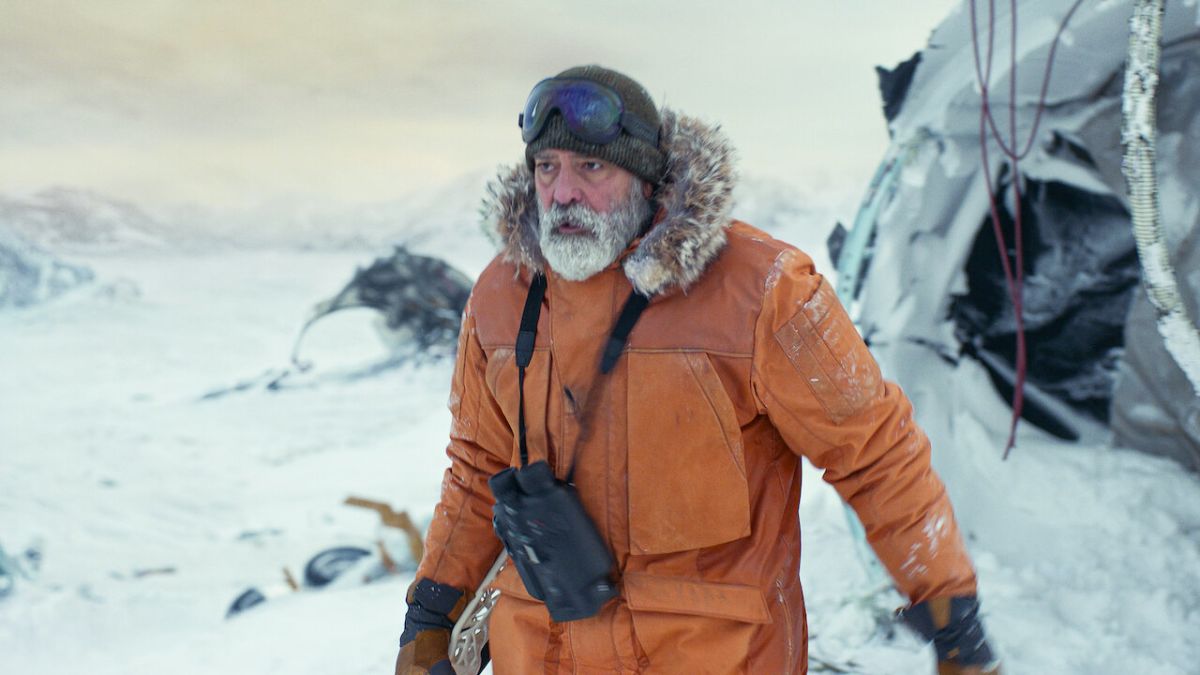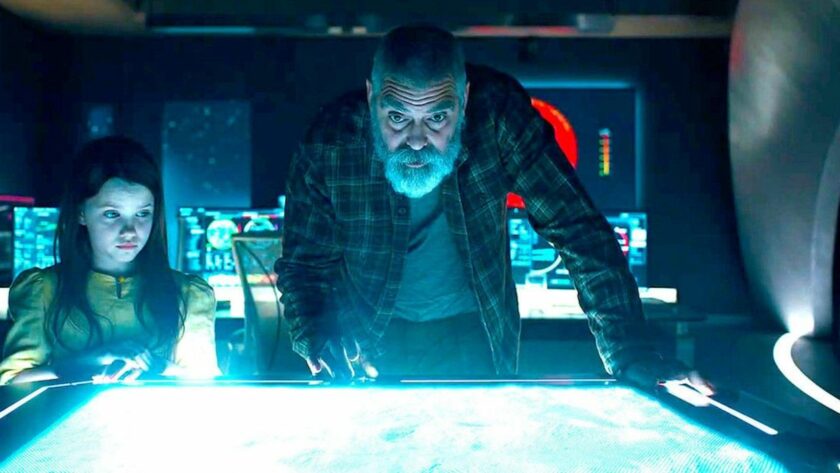Alexander Hancock reviews George Clooney’s latest directorial effort.
In 2049, planet Earth is a wasteland. Mass radiation has ravaged the world after an ambiguous “event”, leaving the few remaining survivors no choice but to live below ground. Above ground, scenes of chaos play out, as flying ships hastily try to bring people to safety, while other groups wait desperately in the bitter cold of the Arctic Circle to join those in the subterranean bunkers. Meanwhile, Æther, the last remaining spacecraft to have explored the depths of outer space for habitable planets, is on its course back to Earth. Morale is high after the crew’s voyage to K-23, one of Jupiter’s moons, confirms their theories that the satellite could support human life. Yet as Earth continues to deteriorate, with hundreds evacuating their posts and communication equipment broken, the crew is oblivious to the state of the home to which they so eagerly wait to return.
Augustine Lofthouse, the film’s protagonist, has one final objective: to warn Æther’s crew of Earth’s plight before it’s too late. Having been diagnosed with a terminal illness, he stays above ground while everyone goes below, pledging to save the last shuttle from making its fateful journey home. As his health continues to diminish with each passing day, so too does his optimism, after he discovers that his observatory’s antenna is down, disrupting any lines of communication to the spacecraft. His last hope is a separate base located far off in the freezing cold of the Arctic, which he believes to have a working antenna that could allow for transmissions. Knowing that his days are numbered and that his final moments could be used to save the lives of others, Augustine decides to make the dangerous trek to the station. Yet, before embarking on his journey, he finds a young girl named Iris, whom he believes was left behind following the mass evacuation. After failed attempts to contact the survivors below ground, Augustine – afraid to leave the girl alone – faces no choice other than to bring her along.

Captaining the film as both leading man and director, George Clooney’s long-awaited return to the screen, albeit small, came at the tail end of 2020 in the form of The Midnight Sky; Netflix’s most recent post-apocalyptic thriller. Four years after his last feature Money Monster, Clooney’s newest positions itself in an ever-growing catalogue of space dramas, alongside the likes of Interstellar and The Martian. Having released promo for the The Midnight Sky back in October, Netflix’s newest sci-fi attracted much excitement from fans of the genre. With Clooney as the lead, accompanied by a strong supporting cast and an intriguing plot, the ingredients for a space epic were all there. And yet with its somersaulting visuals of floating astronauts, scored to ethereal synths (not to mention Clooney’s gravelly platitudes about the degradation of our planet’s environment), the trailer – while impressive – raised the question: how is this film any different to the myriad of other space films from the last ten years?
Unfortunately, this question plagues the film from start to finish. From high-stakes space walks amidst volleys of space debris, to emotional recordings from the crew’s family back home, it’s hard not to draw parallels to scenes from the film’s predecessors, most notably Gravity and Interstellar. With the release of more and more films set in the dark expanse each year, the novelty of the space drama has begun to wear off. And unlike the ingenuity of First Man’s intimate handheld camera work, stylistically, The Midnight Sky falls short in establishing a sense of individuality.

While the brief moments of levity peppered throughout the film provide a much-needed reprieve from the bleak scenes of a dying Earth, the jarring shifts in tone and genre can feel misplaced and at times distasteful. Minutes before a character’s gruesome death, the crew erupts into song, belting the lyrics to “Sweet Caroline” as they float through space. While some scenes in the film echo the staples of a classic adventure story with dangerous run-ins with rabid wolves and arduous treks through harsh blizzards, other parts resemble a sci-fi thriller or a slow-burn drama. The abrupt turns in narrative caused by the constant see-sawing between genres can leave you feeling cold and frustrated. As Augustine dramatically tries to claw his way out of the freezing waters of the Arctic, the crew members aboard the Æther mull over possible baby names. While the puzzle pieces of the story are interesting by themselves, they don’t quite match up. As a result, you end up with a patchwork of drama, comedy, and thrills that never seem to fully blend.
What the film lacks in originality and coherence, it makes up for with impressive visuals and strong performances. The dreamscape of Dr. Sullivan, one of the crew members of Æther, is a particular standout, with the vastness of Jupiter and its many moons looming in the background as she sprints through the lush fields of K-23. Augustine’s dive into the depths of the Arctic as he tries to retrieve his belongings, also boasts some incredible cinematography. As the camera follows him descending further into the cold and darkness of the unknown waters, the harshness of the environment is palpable.

Clooney’s portrayal of a haggard astronomer desperately trying to right his past wrongs is both compelling and convincing. As a man encumbered by regret and sickness, Clooney paints a portrait of an unlikely hero whose devotion to protecting the young girl is unfaltering. Caoilinn Springall’s performance as Iris is moving and powerful; a real testament to the actresses’ skill given her shortage of dialogue. Together, the two leads develop an unlikely and ultimately symbiotic relationship. For Iris, a young child left by her lonesome, Augustine is her only chance of survival. And for Augustine, the girl is the last beacon of hope in a world where all hope seems lost. Amidst deadly meteor showers and violent storms, the crux of the film is the story of two people’s forlorn attempts to survive on a dying planet. Lost and alone, their precious relationship is all that drives them forward.
The Midnight Sky is a stark warning of what our future could be; a world in which radiation has devastated the environment, decimating any sign of life and forcing the few survivors no choice to but to evacuate their homes. Interspersed with the bleak landscape of planet Earth is the vastness of space in which the blinking space shuttle, Æther, journeys home. Witnessing the back and forth between the barren ice sheets of the Arctic Circle and the emptiness of the dark expanse, the apparent contrast between Earth and space becomes less and less clear given their shared desolation. Exploring the calamitous effects of an undefined environmental disaster, the film works best as an admonition of our disregard for the planet.
While The Midnight Sky may not stand out amongst the constellation of space dramas, its striking visuals, captivating performances and important message makes it an enthralling and important watch. Much like the flickering light of Æther’s shuttle as it floats through the darkness of space, the faint glimmer of hope in a film that otherwise offers little optimism, might just be what we need at the end of a turbulent year.




